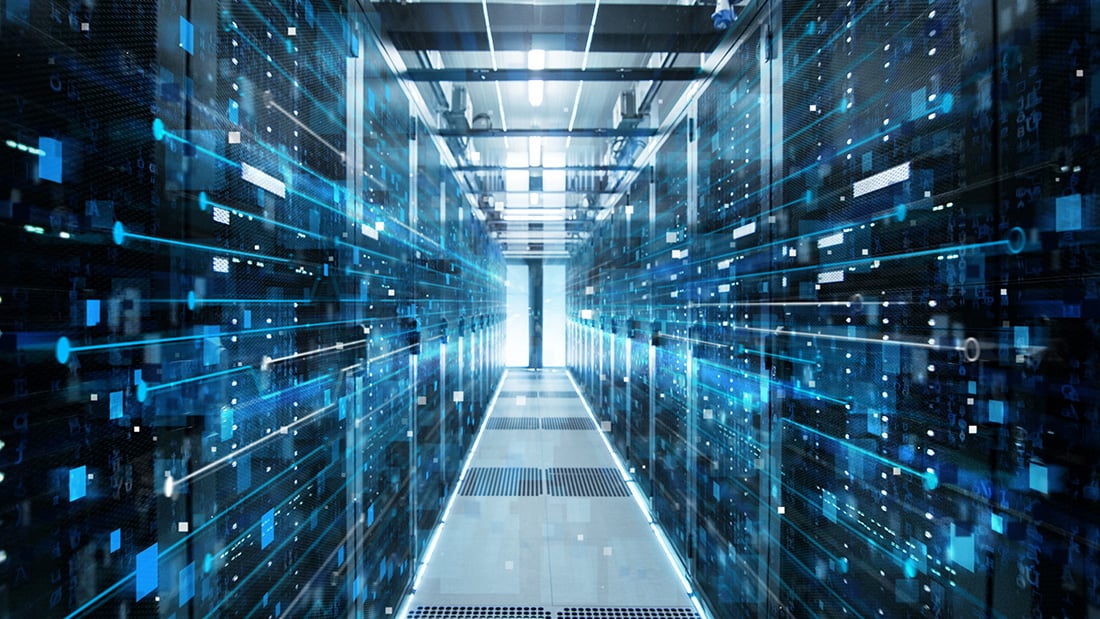
In a previous 2022 blog related to observable trends in commercial real estate, we mentioned that some real estate investors are seriously looking into transforming Class B and C malls from retail or commercial use into other industrial uses, for example, Data Centers. In this post, we expand on that topic by exploring in more detail what characteristics could make for a successful Data Center.
Data Centers are booming.
At AMI Lenders, we are convinced that real estate investors should be thinking about this sector in commercial real estate (Data Centers, that is) in parallel with the thought they give to investing in offices and retail centers. Why? Data Centers, with all their hardware (servers, switches, routers, storage devices, fiber optic transmission equipment, etc.) and specialized infrastructure (AC cooling systems, lightning rods, physical security, among others), are a backbone to our current way of living: think, for example, about cloud storage, Netflix, email, or anything else in cyberspace such as on-line banking, Dr. Google or WhatsApp.
With that said, it has become evident that if we do not build enough Data Centers one day, we might face scarcity. So many real estate investors are starting to develop them in hopes of getting attractive returns. As a consequence, this commercial real-estate subsector is booming.
What Data Center features are essential?
Apart from the fact that Data Centers don’t have to be pretty -in fact, they are quite boxy and windowless- nor do they require lots of parking spaces, the maxim of “Location, location, location” still applies to an alluring and, hopefully, successful Data Center. Specifically, location refers primarily to access to (1) a highly reliable source of electric power and (2) reliable Internet connectivity, both of which are top in the list of location characteristics.
- Data centers aggregate hundreds, if not thousands, of high-powered servers and computers into one large room, with each piece of computing hardware generating heat as a by-product of its computing. Therefore, having efficient and powerful air conditioners throughout the facility becomes vital. These air conditioning units consume lots of electrical power.
- Power redundancy is a critical aspect to offer to Data Center tenants. Data Centers must provide at least one backup power source in case the main supplying utility undergoes an outage. Tenants expect an uninterrupted power supply, so if the power from the utility fails, the Data Center must be conceived and designed to offer a smooth transition to some kind of backup power (whether it be a diesel-operated generator, a battery bank, or a connection to an alternate grid if possible). With more layers of redundancy, a Data Center becomes more attractive to prospective tenants.
- The data stored and processed in a Data Center comes from somewhere and eventually goes somewhere to be utilized. Thus, Internet connectivity is highly relevant. And many Data Centers utilize two or more Internet providers to make sure their tenants can operate continuously and with sound data quality transmission.
A third feature of Data Centers, which could or could not be related to their location, is their increased security levels. Data centers are much more secure than standard office buildings. Stricter security levels will include digital and biometric controls for access, full-time security guards, cages made of chain-link fences to separate different clients’ servers within the data center, movement detection alarms, fire sprinklers systems that use specialized chemicals instead of water, video surveillance inside and outside, and multiple other control points.
Other things to know about Data Centers
Any company that uses the Internet processes information and/or stores data can be a Data Center tenant, especially if their business model requires them to operate 24/7. And most of them feel more comfortable housing their equipment in specialized buildings than on their premises.
Data Centers tend to cluster in a few geographic areas. Datacenter tenants want to be near other data center tenants. And with regards to good connectivity, it is easier and cheaper to run a fiber optic cable across the same industrial park than to run a connection across the state or country.
If you retrofit an existing facility, you should contract a specialized engineering firm with demonstrable Data Center experience. Modern Data Centers are designed with raised floors, making it easier to run cool air under the floor and into the server rooms. That feature makes room ceiling heights important; furthermore, you must plan for chilled water pipes, cabling, and wiring with known industry standards. You could find out from their experience that the property you are looking to retrofit is not entirely suitable for your business initiative.
Summary
Data Center development is quickly becoming a specialty in the commercial real-estate business. An investor could potentially generate attractive returns by repositioning a struggling property, such as a Class B or C mall, into a local Data Center. Retrofitting malls into Data Centers requires capital, knowledge, and the involvement of a lender who understands the economics of Data Centers.
At AMI Lenders, one of Houston's most reliable private commercial mortgage lenders, we understand retrofitting. We will become your financial and expertise ally. We fund our loans and can move as fast as the law allows. Borrowers in Houston will also have difficulty finding lower rates for hard money or private loans than we offer. We want our customers to succeed and take advantage of the financial opportunities provided in real estate investments. Visit our This page today and apply for a loan backed by a commercial property.



